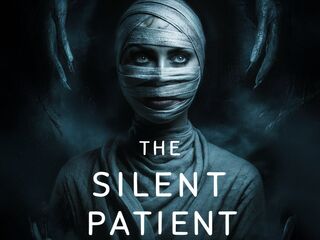Ought to Have Left: A Deep Dive into the Gripping Pressure of a Missed Alternative
Associated Articles: Ought to Have Left: A Deep Dive into the Gripping Pressure of a Missed Alternative
Introduction
With enthusiasm, let’s navigate by way of the intriguing matter associated to Ought to Have Left: A Deep Dive into the Gripping Pressure of a Missed Alternative. Let’s weave fascinating data and supply contemporary views to the readers.
Desk of Content material
Ought to Have Left: A Deep Dive into the Gripping Pressure of a Missed Alternative

The web is awash with tales, some meticulously crafted, others stumbling haphazardly in direction of a conclusion. However few handle to seize the uncooked, visceral stress of a missed alternative, the agonizing weight of a call made, and the chilling penalties that unfold with agonizing slowness. That is the territory occupied by the fictional movie, "Ought to Have Left," a psychological thriller that burrows beneath your pores and skin and refuses to let go. Whereas the movie is not with out its flaws, its masterful manipulation of suspense and its exploration of the insidious nature of guilt and paranoia make it a compelling watch, even for those who would possibly want, in hindsight, you’d stayed away.
The premise is deceptively easy. A profitable architect, Michael (Kevin Bacon), his a lot youthful spouse, Susanna (Amanda Seyfried), and their younger daughter, Ella, escape to a secluded, modernist home within the Welsh countryside. The home, a brutalist masterpiece perched precariously on a cliff overlooking the turbulent sea, is meant to be a refuge, a spot to heal after a interval of household turmoil. Nonetheless, the idyllic setting rapidly unravels, revealing a darkness that mirrors the cracks forming inside Michael’s personal psyche.
The movie’s power lies not in its plot twists, that are predictable to a level, however within the creeping dread it instills. The narrative unfolds slowly, meticulously constructing a way of unease by way of delicate visible cues and unsettling sound design. The home itself turns into a personality, its imposing construction and labyrinthine corridors reflecting the disorientation and claustrophobia that grip Michael. The fixed wind howling outdoors, the echoing vacancy inside, the unnerving shadows that dance within the periphery – these components contribute to a pervasive environment of dread that retains the viewer on edge.
Probably the most efficient facets of "Ought to Have Left" is its exploration of Michael’s inner battle. Bacon delivers a compelling efficiency, portraying a person wrestling with guilt, paranoia, and the disintegration of his actuality. His preliminary makes an attempt to rationalize the unusual occurrences inside the home – unexplained noises, unsettling visions, and the more and more erratic conduct of his spouse – regularly give solution to a chilling acceptance of the supernatural, or maybe, the psychological. His descent into insanity is palpable, and the viewer is compelled to confront the uncomfortable reality that his perceptions may be as unreliable as the home itself.
Seyfried, too, offers a nuanced efficiency as Susanna. Whereas initially offered as a considerably enigmatic determine, her character reveals layers of complexity because the movie progresses. Her conduct, at instances erratic and unsettling, is open to a number of interpretations, leaving the viewers questioning her motives and sanity. This ambiguity is essential to the movie’s effectiveness, because it forces the viewer to query their very own assumptions and interpretations of occasions.
The movie masterfully employs visible storytelling. Director David Koepp makes use of the stark, minimalist aesthetic of the home to amplify the sensation of isolation and confinement. The digicam angles are sometimes unsettling, emphasizing the vastness of the area and the vulnerability of the characters inside it. Lengthy, lingering pictures emphasize the silence and the vacancy, permitting the viewers to soak up the unsettling environment. Using shadows and darkness is especially efficient, creating a way of foreboding and thriller.
Nonetheless, "Ought to Have Left" isn’t with out its weaknesses. The pacing, whereas deliberate, can really feel gradual at instances, notably within the first act. The movie depends closely on environment and suspense, and a few viewers would possibly discover the shortage of overt motion irritating. The narrative additionally depends on a number of tropes frequent to the psychological thriller style, which could really feel acquainted to seasoned viewers. The final word revelation, whereas efficient in its personal means, may not be as stunning or stunning as some would possibly anticipate.
Regardless of these shortcomings, the movie’s strengths outweigh its weaknesses. "Ought to Have Left" is a masterclass in constructing suspense and making a deeply unsettling environment. The movie’s exploration of paranoia, guilt, and the fragility of the human psyche is each compelling and thought-provoking. The performances are sturdy, the course is assured, and the visible storytelling is masterful.
The movie’s title itself is an important component. "Ought to Have Left" is not only an announcement concerning the household’s choice to remain in the home; it is a meta-commentary on the viewer’s personal expertise. As the strain ratchets up, the viewers finds themselves asking the identical query: ought to I’ve stored watching? The movie’s energy lies in its potential to induce a way of unease that lingers lengthy after the credit roll. It is a feeling of unease that’s each unsettling and unusually compelling, a testomony to the movie’s success in creating a really immersive and disturbing cinematic expertise.
The movie’s ambiguous ending additional contributes to its lasting impression. It leaves the viewers with unanswered questions, forcing them to grapple with the implications of the occasions they’ve witnessed. Is what Michael experiences actual, or is it a manifestation of his personal inner struggles? The movie refuses to offer simple solutions, leaving the interpretation as much as the viewer. This ambiguity, whereas irritating to some, is exactly what makes the movie so memorable. It encourages repeated viewings, every time revealing new layers of which means and interpretation.
In conclusion, "Ought to Have Left" is a movie that calls for consideration, not only for its plot, however for its masterful creation of a suffocating environment and its exploration of the human psyche beneath stress. Whereas it may not be for everybody, notably those that desire fast-paced motion over slow-burn suspense, it presents a uniquely unsettling and memorable cinematic expertise. The query of whether or not you "ought to have left" throughout the viewing is one you will seemingly ponder lengthy after the credit have pale, a testomony to the movie’s lingering energy and its success in creating a really unforgettable, if unsettling, journey into the guts of darkness. The movie’s lingering unease is its biggest triumph, a testomony to its potential to faucet into primal fears and anxieties, leaving the viewer with a chilling sense of what might need been, and what may nonetheless be lurking simply across the nook.







![Dive into Deep Learning - Free eBooks of IT [BooksOfAll]](https://www.booksofall.com/wp-content/uploads/2023/02/Dive-into-Deep-Learning.jpg)
Closure
Thus, we hope this text has supplied useful insights into Ought to Have Left: A Deep Dive into the Gripping Pressure of a Missed Alternative. We thanks for taking the time to learn this text. See you in our subsequent article!